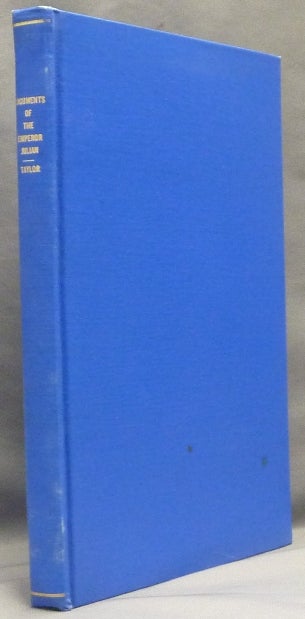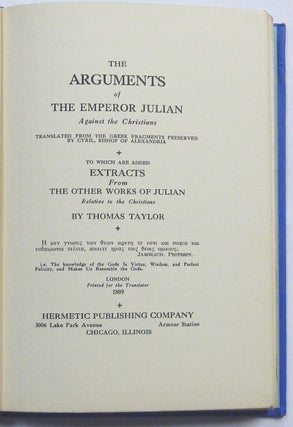The Arguments of The Emperor Julian Against the Christians Translated from the Greek Framents Preserved by Cyril, Bishop of Alexandria; To which are added Extracts From The Other Works Of Julian Relative To The Christians
Chicago, IL: Hermetic Publishing Company, 1932. Limited Edition. Hardcover. Octavo. 120pp. Original bright blue cloth w/ gilt titles, etc. to spine, top edge gilt, headband, colored endpapers, printed on watermarked laid paper. Edition limited to 500 copies. A translation of the remains of the "lost work" by the Roman Emperor Julian (Flavius Claudius Julianus: 331 – 363 CE), philosopher and author in Greek whose rejection of various aspects Christianity and call for the revival of the old pagan faiths and embrace of Neoplatonic Hellenism caused him to be remembered as "Julian the Apostate" by the Christian Church. The text here is reprinted from the Thomas Taylor translation of 1809. Thomas Taylor (1758 - 1835), was a leading exponent of Neo-Platonic thought, and was largely responsible for it's rediscovery in English-speaking mystical circles, by his translations of Iamblichus, Proclus, Porphyry and other Neoplatonists and Pythagoreans. Taylor, a one time bank-clerk who devoted himself to the classics, was said to be such a devotee of Hellenic paganism that he and his wife spoke only to one another in classical Greek. It was Taylor's translations that introduced the Romantic poets to Platonism, and in the US his work was enthusiastically embraced by Emerson and a number of his followers, and in the UK was rediscovered by G. R. S. Mead, and others involved in other turn of the century occult and mystical movements. An unused copy with just the faintest of shelf wear from age, a few light spots of browning to upper board and front pastedown, otherwise appears "as new" - thus a tight near Fine copy. (no dust jacket issued). Item #66823
Sold




